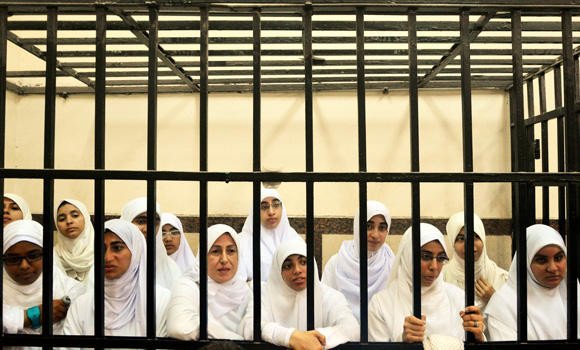Author: Sahar Khamis
Affiliation: Arab Center Washington DC
Organization/Publisher: Arab Center Washington DC
Date/Place: Sept 9, 2021/USA
Type of Literature: Article
Word Count: 2010
Link: https://arabcenterdc.org/resource/arab-women-political-prisoners-jailed-by-us-middle-east-allies/
Keywords: Arab, Women, Human Rights, USA
Brief:
The author states that when the Biden administration came, it gave hope that it would care about human rights but in reality nothing has changed. The author focuses on imprisoned women in Egypt, Israel, and Saudi Arabia. Firstly Egypt, women’s rights have significantly worsened after the military coup of 2013. The author identifies how many women have been arrested like Sanaa Seif as all she did was to show the reality of her brother Alaa Abdel Fattah’s life in prison. Many other activists, journalists and regular women have been taken to jail like Nora Younis, Mahinour El Masry and many more for similar reasons. As stated by the author, some people believe that the only way of ending human rights violations is by the US pressuring Egypt to limit these misconducts. Secondly, Saudi Arabia—known for its conservative ideology especially regarding women’s rights—has detained and imprisoned women activists like Manal Al Sharif and Mayya Al Zahrani who demanded the right to drive cars. Ironically, Mohammad Bin Salman allowed women to drive cars in order to galvanize Western support but while still detaining such activists. According to Saudi advocate Hala Al-Dosari, these contradictions demonstrate his efforts to present himself as the ultimate giver of human liberties, and as the benign ruler with the authority to give or refuse them while penalizing activists seeking to obtain the same entitlement. Thirdly Israel, where women like Anhar Al Deek have been arrested for no apparent reason. The author states that as Israel is supported by the US it is very unlikely to hear anyone in Israel criticizing human rights, and if someone does he or she faces huge backlash. When it comes to human rights violations, the US should pay closer attention to its relationships with foreign governments. The author believes that to find a solution we need to adequately investigate the underlying causes of why the United States is cautious and shows restricted engagement in maintaining women’s rights.
By: Zeina Akef, CIGA Research Intern




